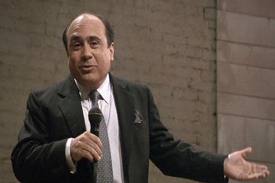Working on Wall Street–Margin Call: http://youtu.be/0rqofLr9HE0
The way to make money on Wall Street- Margin Call: http://youtu.be/xOO1NY6ctYU
You are getting fired-Margin Call: http://youtu.be/2f2kGHcdJYU
 Danny Devito as Ben Graham in Other People’s Money, “Show me the numbers.” http://youtu.be/yypj-aYtp9c
Danny Devito as Ben Graham in Other People’s Money, “Show me the numbers.” http://youtu.be/yypj-aYtp9c
Danny Devito as “Larry the Liquidator” says, “I’m NOT your best friend, I am your ONLY friend” http://youtu.be/p7rvupKipmY
Boiler Room: “RECO!” http://youtu.be/4zakyg3thfY You could do a thesis on all the psychological ploys used to make this sale. Also, http://youtu.be/izOIOvguncU Always be closing!
Wall Street: “Because it’s wreckable.”http://youtu.be/2Mr4mjeZ2ko
Trading Places: Learning about commodities: http://youtu.be/7EjdC0pjo1A
Valuation Study in Trading Places, “Well, in Philadelphia, it is worth 50 bucks: http://youtu.be/jLo7tHDHgOc
Auction market: http://youtu.be/uZ94J09IsHA
Trading Soybeans (How would you like to do THAT all day?) http://youtu.be/XZEBz01t5vg
In those short clips you will grasp more than many beginning MBAs of how the world works. Good luck!
Appendix: Comment: A movie like this is not a sign of a Bull Market. The movie reflects and/or caters to the Public’s disgust with Wall Street.
| SATURDAY, SEPTEMBER 8, 2012
Wall Street Meets Hollywood. Greed Ensues.
By MARTIN FRIDSON | MORE ARTICLES BY AUTHOR
A review of the new Richard Gere vehicle, Arbitrage, in which a wealthy hedge-fund manager is—surprise—the villain. Suggestion to the filmmakers: Check the dictionary before you title your next movie.
“Arbitrage—buying low and selling high—depends on a person’s ability to determine the true value of any given market,” reads the program note for the Sundance Film Festival, where writer-director Nicholas Jarecki’s movie Arbitrage was screened to rousing acclaim in January.
From the start, then, someone got the definition wrong. Whoever wrote that program note apparently believes arbitrage—simultaneously buying and selling the same asset at difference prices—is just another form of value investing (“buying low and selling high”).
Call me a purist, but if you pay good money to watch a movie called Arbitrage, you should get to see a little of it. Arbitrage depicts nobody in the act of arbitrage. Not that this would be the first time title and content diverge. At least the hedge-fund manager in Arbitrage does engage in hedging (laying off risk), unlike some real-life firms that call themselves hedge funds without actually hedging.
Richard Gere stars as Robert Miller, a successful hedge-fund manager who illegally covers up a $400 million loss, then attempts to escape the consequences by selling his company. The sale becomes more difficult when he commits another crime in the course of a bit of wife-cheating with a sexy art dealer. That leads to a second coverup and to a breach with his adoring and idealistic daughter, who is also the firm’s chief investment officer.
Compared with other films on finance worth seeing—admittedly, a short list—Arbitrage fails to give the stock market a pivotal role. Director Oliver Stone’s Wall Street, which features Michael Douglas as takeover artist Gordon Gekko, creates tension with a takeover battle. That film also shows protagonist Charlie Sheen breaking the insider-trading laws instead of just telling the audience about it.
In Boiler Room, the most engrossing action consists of penny-stock salesmen conning their victims. By contrast, Gere’s Robert Miller has already committed his financial crime by the time the action begins.
It might be objected that Arbitrage would lose the average moviegoer by dwelling on the details of securities transactions. But the excellent finance film Margin Call, which does depict margin calls, manages to convey the essential facts about complex derivatives to a general audience. By declining the challenge of portraying finance on-screen, Arbitrage becomes a film as much about its peripheral subjects—police work, the art world, and philanthropy—as the stock market.
BEYOND BEING MISNAMED, the film lacks one key ingredient of the most enduring investment-oriented movies: an instantly quotable line. Wall Street had “Greed is good.” The cult favorite Boiler Room had “You got a cannoli you can stick in your mouth?”—followed by a rejoinder that is not printable in a family magazine. The best Arbitrage can offer is this response to the observation that it’s a cold world: “You’d better get a warm coat.”
The Bottom Line
In addition to being a thriller with few thrills, Arbitrage even bungles the meaning of its title. Wait for this one to come to cable.
But hey, this is a movie: Whether or not Arbitrage holds up as a finance film, is it a decent popcorn picture that spins a suspenseful yarn? It benefits from some good acting. Richard Gere is more than adequate in the lead. Susan Sarandon, already experienced at playing Gere’s long-suffering wife (in Shall We Dance?), again fulfills that duty with finesse. Tim Roth and Nate Parker shine in supporting roles. CNBC’s Maria Bartiromo plays Maria Bartiromo in a cameo that adds luster to the proceedings.
Key plot twists are at times cleverly foreshadowed. Characters reveal unexpected depth as they confront not-so-easy moral choices. A tearful embrace that occurs at a funeral is a powerful use of dramatic irony, and the story’s resolution denies viewers any smug satisfaction that all’s well that ends well.
But these individual touches are too infrequent. If Arbitrage were a bond, it would make investment grade, but just barely.
This shortfall raises the question of why Arbitrage garnered such raves at Sundance, even spurring talk of an Oscar for Richard Gere. The critics’ huzzahs are hard to explain on purely cinematic grounds. As an exploration of family betrayal, Arbitrage is no more than workmanlike. Unlike the best thrillers, it will leave most stomachs unknotted.
THE SUNDANCE CRITICS WERE probably won over by writer-director Jarecki’s choice of a fashionable political theme, the 1% versus the 99%. And you can never go wrong in Hollywood by making the businessman the villain.
Gere’s Robert Miller stands a good chance of prevailing over the law-enforcement system, thanks to his immense wealth, unlike the working-class youth he draws into his crime, played by Nate Parker. The detective, played by Tim Roth, who pursues Miller openly complains that he is in an unfair fight if he must pursue such a privileged perpetrator without having license to fake the evidence. To compound the corruption at the top, we learn that Miller cut corners even in the supposedly lawful phase of building his fortune.
Arbitrage will be released in theatres Friday, Sept. 14. Will media critics also be seduced by the film’s populist theme, or will they judge it according to more rigorous standards of movie-making? That question is as suspenseful as anything you’re likely to see in Arbitrage.





